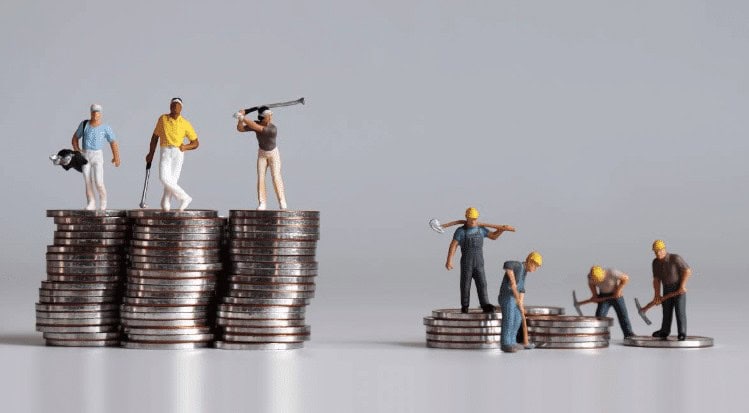PLAYWRIGHT Arthur Miller once observed that “an era can be considered over when its basic illusions have been exhausted.” Right now some key illusions of the neoliberal era have just about run out of puff.
The fundamental illusion that is not-so-quietly being dismantled is the offensive notion that everyone pretty well gets what they deserve. In other words, if you work hard, you’ll do well. And if you don’t, well, you have only yourself to blame. It was this illusion that allowed us, as a society, to accept both soaring profits on the one hand and deepening poverty and precarity on the other.
Despite the pleadings from some of the more shameless sections of the corporate world, the facts speak for themselves. In the last quarter of 2022 corporate profits rose by 10.6 per cent while wages rose by only 2.6 per cent. Why have companies such as Qantas been able to chalk up a $1 billion profit, representing, according to The Business’s Rachel Pupazzoni, “more than a 50 per cent improvement on the margins it had before the pandemic”? Because they can! In the meantime, Reserve Bank governor, Philip Lowe, continues to defend the indefensible imposition of rate rises, punishing working people while failing to address inflationary profiteering.
Poverty does not just happen. To suggest that people just “fall into poverty” is like suggesting that someone who has just received a kick in the head somehow fell into the trajectory of the boot. Like that kick in the head, poverty is not some kind of chosen or accidental state of existence.
Like that kick in the head, poverty is done to people, by a combination of wage suppression, union bashing, unfettered price rises, and the dismantling or denuding of key social infrastructure, including social security. Trying to understand the causes of poverty by focusing exclusively on the people subjected to it would be like studying the person who has been kicked while ignoring the head-kicker. Of course, we need to give urgent attention to the person who has been assaulted, but we also need to find the head-kicker and prevent them from repeating their act of violence.
If we want to analyse and address the causes of poverty, we need to start looking at who, or what, is doing the impoverishing, instead of focusing almost exclusively on changing the behaviour of the person who has been impoverished.
People are clearly waging a daily battle from below the poverty line if they are forced to survive on JobSeeker, which now sits cruelly at $668 a fortnight. Increasing numbers of people in paid work, however, are also caught and crushed between the jaws of rising prices and falling real incomes, with 16.5 per cent of workers earning less than $600 a week and a record 895,900 workers having to work two or more jobs. There is nothing good and nothing acceptable about poverty and precarity, whether you’re in paid work or not.
As the ANU’s Professor Sharon Bessel recently declared on the ABC’s 7.30, in a harrowing report that described how children are hiding their hunger to avoid burdening their parents, “It is unjust for little children to be hungry. We need to collectively say we do not want this injustice to continue.”
Any attempt to unravel the conditions in which poverty and precarity have been imposed on people will need to begin with a reversal of the two key trajectories of neoliberal capitalism.
Firstly, instead of dismantling social infrastructure, we need to strengthen it, ensuring that it is appropriately resourced to be responsive to changing social and economic conditions. Secondly, instead of letting the profits rip by allowing unscrupulous corporates to rob people of both pay and conditions, while jacking up the prices we pay for essentials, we need to create the institutional settings so that workers can join together in pursuing our collective interests and the betterment of social conditions.
The way forward beyond the destructive illusions of the neoliberal era requires a tax system that is unashamedly progressive and rigorous in its enforcement of just tax laws on companies and high-wealth individuals. But we also need to envision a more democratic approach to economic decision-making, starting with institutions such as the Reserve Bank, but continuing into the other areas that affect our livelihoods and our lives, from protecting the rights of workers through their unions, to building frameworks that have the capacity to control prices for essentials where necessary.
Poverty, like wealth, is a power relation. If we want to understand it, and change it, we need to study the structures and stories that aid and abet the massive concentration of power and accumulation of wealth that happens at the same time.
Trickle-down theory is no mystery. It is an excellent example of the so-called common sense that is designed to throw us off the scent of what is really happening, trying to convince us that the obscene proliferation of mega-profits should not only be allowed but encouraged because it is the only means of salvation for those who are living in poverty.
But the lie was exposed for what it was. And who exposed it? Just as only women could expose the lie at the heart of patriarchy, and just as only First Nations People could expose the lie at the heart of colonisation, it was workers who exposed the lie at the heart of neoliberal capitalism.
The lie is always the same: This is the natural order of things. Everyone gets what they deserve. And the truth is always the same too, namely that these systems feed on deliberate disempowerment and degradation. We reject the dismal claim that inequality is somehow fair. Let us not fall prey to the illusion that there is no alternative.

